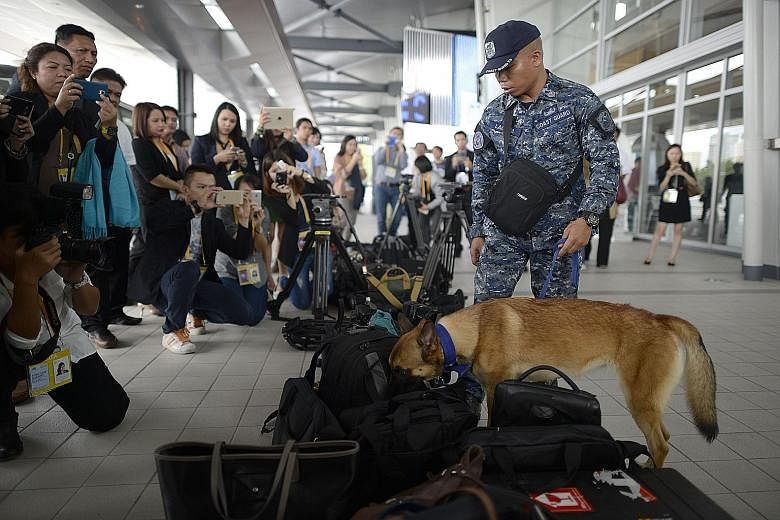South China Sea tensions and security fears following the Paris terrorist attacks are overshadowing efforts by Pacific Rim leaders to hammer out deals this week to boost trade in a region of around three billion people.
The Philippines initially promised to keep South China Sea territorial rows off the agenda in the two-day Asia-Pacific Economic Cooperation (Apec) summit starting tomorrow, following China's insistence that the topic was not relevant in meetings meant to focus on trade.
But officials said disputes that have simmered over the key shipping zone, through which US$5 trillion (S$7 trillion) in trade passes every year, will be high on the agenda when the leaders of the Philippines, the United States, Japan and Vietnam meet behind closed doors on the sidelines of the summit.
US National Security Adviser Susan Rice said the South China Sea would be a "central issue" during President Barack Obama's three-day trip to the Philippines.
Mr Obama, who is due in Manila today along with 16 other world leaders, including from Japan, Canada and Australia, is expected to challenge Chinese President Xi Jinping and raise the issues of "maritime security" and "freedom of navigation".
China insists it has sovereign rights to nearly all of the 3.5 million sq km of the energy-rich South China Sea, even waters that are as far as 1,611km from its coastline and closer to its smaller neighbours.
Tensions have escalated after China stepped up its land reclamation efforts in the Spratly archipelago, where it has so far created islands with airstrips and garrisons on seven reefs it occupies. The US has sent a guided-missile destroyer and a B-52 bomber to the islands to assert "freedom of navigation" in the area.
Soon after arriving in Manila, Mr Obama is scheduled to board the BRP Gregorio del Pilar, a former US coast guard cutter the Philippines acquired in 2011 and now uses as a navy flagship.
The event is meant to showcase "US maritime security assistance to the Philippines and the region", according to Mr Obama's aides.
Japanese Prime Minister Shinzo Abe, meanwhile, is set to meet Philippine President Benigno Aquino, reportedly to conclude - by Thursday - a deal allowing Tokyo to help Manila secure its borders with used military equipment, possibly including surveillance aircraft.
A Reuters report said while the agreement will not include specific aid for now, Japan may begin by supplying three Beechcraft TC-90 King Air planes, currently used to train Japanese Self-Defence Force pilots, that can be fitted with basic surface and air surveillance radar. That might then be followed by used Lockheed Martin submarine-hunting P3-C patrol planes.
The Philippines and Vietnam are also set to hold bilateral talks today to ink a strategic defence deal involving more military staff exchanges, port visits, information sharing and naval drills.
Many of the leaders are arriving in Manila after the Group of 20 talks in Turkey, where Friday's attacks in Paris that killed at least 129 people also overshadowed the agenda.
Philippine security officials reissued an assurance that there were no credible terrorist threats to the more than 7,000 delegates, ministers and leaders gathering for Apec.
A video posted late on Sunday on Facebook shows purported Islamic State in Iraq and Syria supporters in the Philippines threatening to disrupt this week's meetings.
"As of now, we can say definitely that there is no such threat," police spokesman Wilben Mayor told reporters yesterday. "We didn't receive any reports with regard to this Apec event."
Behind closed doors, senior diplomats were said to be divided over whether to issue a statement on the attacks or let each leader speak.

